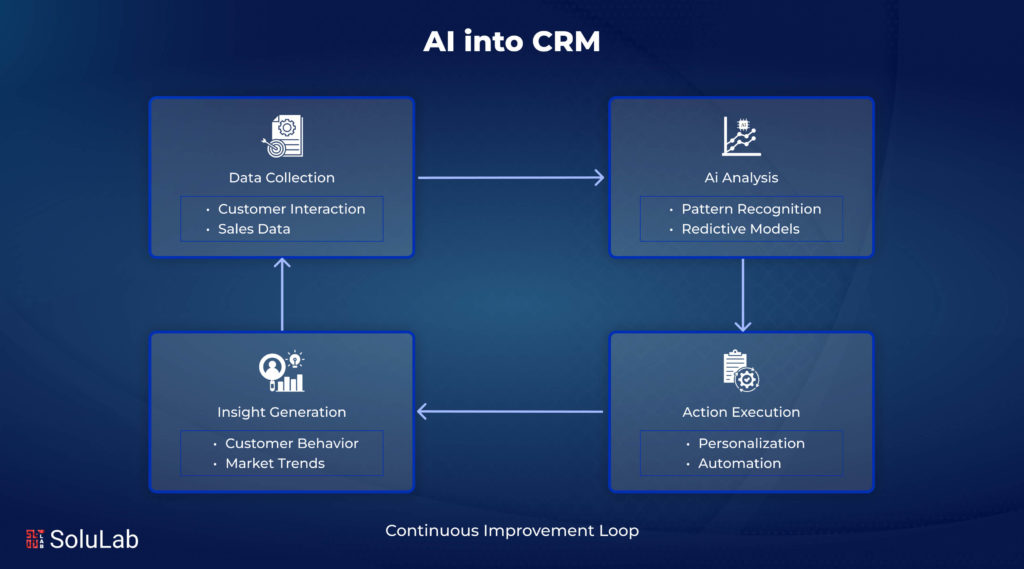
CRM software driven by artificial intelligence is changing the way companies handle customer contacts by automating tedious but necessary processes like data cleaning, customer segmentation, and data input. Artificial intelligence (AI) boosts productivity and consumer involvement by decreasing human mistakes and improving decision-making using predictive analytics.
Market study indicates that by 2029, the CRM business will have grown to $145.8 billion, with AI playing a significant role in this expansion. Companies are increasingly looking at ways to integrate AI with CRM to improve lead management, customize customer experiences, and expedite procedures.
From AI-driven sales projections and sentiment analysis to chatbots and virtual assistants for real-time customer service, there are many AI use cases in CRM. Tools driven by AI may wade through piles of consumer data, allowing companies to better plan and improve their marketing efforts. Machine learning algorithms additionally assist with predictive analytics and lead scoring, which helps sales teams zero in on the most promising leads. In this blog, we will discuss the various AI applications in CRM, the benefits, and practical ways that organizations may use AI to improve their CRM strategy.
The Importance of AI for Customer Relationship Management
Businesses are reshaping customer interaction, data management, and marketing strategy optimization with the inclusion of AI in CRM systems. AI in CRM improves efficiency via the automation of mundane operations, the mitigation of human error, and the provision of real-time insights for more informed decision-making. Chatbots, virtual assistants, and automatic email answers are all ways AI-driven CRM systems expedite customer interactions. This, in turn, guarantees a more engaging and customized experience. By analyzing massive volumes of client data, these smart technologies help companies boost customer retention rates, enhance service quality, and predict customer requirements.
In addition to automating repetitive tasks, AI in CRM systems is vital for predictive analytics, which aids companies in predicting sales trends, locating valuable leads, and tailoring marketing efforts to individual customers. Lead scoring is improved by machine learning algorithms, and engagement techniques are fine-tuned using sentiment analysis technologies that measure client emotions. Revenue-boosting cross-selling and upselling possibilities are further enhanced by AI-powered suggestions.
How Does Generative AI Work in Customer Relationship Management Systems?
Generative AI is reinventing customer relationship management via process automation, customization enhancement, and decision-making improvement. The use of generative AI in customer experience allows organizations to provide AI-driven interactions in real time, optimize processes, and derive insights supported by data for improved engagement. With this innovation, CRM systems may be more flexible, effective, and focused on the client.
The following are some ways in which firms might benefit from generative AI in CRM:
- Personalized Customer Support: Interactive chatbots and virtual assistants driven by artificial intelligence provide personalized customer support in real time.
- Automated Content Creation: Creates individualized emails, reports, and marketing material automatically to improve outreach.
- Sales Forecasting & Lead Scoring: Utilizes insights powered by AI to detect valuable leads and forecast sales patterns.
- Customer Sentiment Analysis: Examines feelings and comments to improve interaction tactics.
- Process Automation: This feature automates common duties such as data input, appointment scheduling, and follow-ups.
- Smart Recommendations: Provides prospects for upselling and cross-selling by recommending matching items or services.
Integrating Generative AI with CRM allows firms to boost productivity, maximize customer interaction, and improve marketing and sales results overall.
Key AI Technologies in Modern CRM Systems
Through process automation, better customization, and improved decision-making, AI is redefining customer relationship management (CRM). The use of generative AI in CRM applications is vital for automating content production, improving customer interactions, and providing predictive insights. With the help of AI-powered solutions, companies may streamline processes and provide better customer service.
A few important AI technologies used in CRM are:
- Machine Learning: Improves lead scoring, customer insights, and sales projections via the use of machine learning (ML).
- Natural Language Processing: The ability for AI chatbots and virtual assistants to communicate effortlessly is enabled by Natural Language Processing (NLP).
- Generative AI: It automates the process of creating tailored emails, content, and answers for customers.
- Predictive Analytics: It makes predictions about future consumer actions, patterns, and potential revenue streams.
- Sentiment Analysis: Analyzes client emotions to improve engagement techniques.
- Robotic Process Automation (RPA): Automating repetitious CRM operations for efficiency is achieved using Robotic Process Automation (RPA).
Using these AI solutions, businesses may increase customer relationship management (CRM) efficiency, data-driven decision-making, and client interactions.
Benefits of AI in CRM
Customer relationship management (CRM) solutions that use AI improve customer interactions, simplify processes, and increase company performance. CRM systems driven by AI let companies sift through mountains of customer data, make predictions about their actions, and tailor their interactions with the brand, all of which contribute to more engagement and better business decisions. Artificial intelligence (AI) helps businesses save money, automate processes, and strengthen connections with customers by improving marketing and sales efforts.
A few key benefits of AI in customer relationship management are as follows:
- Improved Product Suggestions: Artificial intelligence studies consumer tastes, previous purchases, and web surfing habits to propose pertinent goods, leading to happier customers and more sales.
- Increased Conversion Rates: Businesses may improve their targeting efforts and boost conversion rates by using AI-driven lead scoring and predictive analytics to select high-value prospects.
- Decreased Customer Churn: Artificial intelligence can identify customers who are likely to leave based on their behavior and empower firms to proactively engage with them by providing targeted offers or prompt follow-ups.
- Optimized Content Discovery for Customers: AI curates and suggests customized content, which improves content discovery for consumers, speeds up their search for relevant information, and leads to higher engagement and a smooth user experience.
- Saving Money: By automating routine processes like data entry, customer service inquiries, and follow-ups, operational expenses may be decreased without sacrificing efficiency or speed.
- Increased Return on Investment (ROI): With the help of AI-driven insights, companies can enhance their plans for sales, marketing, and customer support, enabling them to better manage resources and achieve maximum profits.
- Enhanced Customer Loyalty: An increase in brand loyalty may be achieved via the use of AI-driven customization, proactive engagement, and intelligent customer care, which all work together to establish trust and foster long-term connections.
How to Use AI in CRM?
Customer relationship management (CRM) solutions that use AI may automate operations, improve decision-making, and greatly increase customer engagement. Businesses may improve their understanding of client behavior, simplify processes, and customize interactions with the help of AI-driven solutions. Sales, marketing, and customer support tactics may be optimized with the aid of AI-powered CRM systems. This optimization leads to higher efficiency, more income, and happier customers.
Using AI in CRM systems may be done in several ways:
- Automating Data Entry and Management: AI can do away with human mistakes in data input by automatically recording and updating customer information, making sure that records are correct and current.
- AI-Powered Chatbots & Virtual Assistants: The use of artificial intelligence (AI) in chatbots and virtual assistants allows for better response speed and engagement, as well as real-time customer service, query answering, and troubleshooting assistance.
- Improving Customer Experience and Retention: AI examines client data to customize interactions, suggest items, and deliver tailored communications.
- Sales Forecasting & Lead Scoring: The sales funnel may be optimized with the use of artificial intelligence (AI) that forecasts sales trends, assesses the potential of leads, and assists sales teams in focusing on prospects with high conversion rates.
- Customer Sentiment Analysis: AI can identify client emotions via reviews, social media, and emails, which helps firms improve customer happiness by adjusting strategy.
- Marketing Strategy Optimization: AI can divide people into different groups, forecast how successful a campaign will be, and automate targeted marketing to boost engagement and conversion rates.
- Predictive Analytics for Customer Retention: AI-powered predictive analytics can identify consumers who are likely to churn and then provide suggestions for proactive engagement measures to keep them as clients.
- Automated Follow-Ups & Reminders: AI sets up automatic reminders, follow-ups, and appointment scheduling to cultivate leads and enhance connections with customers.
- Fraud Detection & Risk Management: Anomalies may be identified and any fraudulent behaviors can be flagged by CRM systems driven by AI, which helps to ensure that client transactions are safe.
AI Applications in CRM
Businesses are now able to automate processes, make better decisions, and manage client relationships in a whole new light thanks to AI integration in CRM. Improved customer service, more effective marketing, and more personalized interactions are all possible thanks to AI-powered technologies. Businesses may improve engagement, retention, and income by using AI to evaluate massive volumes of consumer data and derive meaningful insights.
Here are some key AI use cases in CRM:
1. Automated Lead Scoring & Qualification: AI examines consumer activities, previous contacts, and engagement levels to rank leads according to their worth, allowing sales teams to concentrate on prospects that have the best chance of converting.
2. AI-Powered Chatbots & Virtual Assistants: AI-powered chatbots enhance response speed and efficiency by providing real-time customer assistance, handling questions, scheduling appointments, and offering self-service alternatives. Virtual assistants powered by AI may do the same.
3. Personalized Marketing Campaigns: Businesses can design marketing campaigns that are highly targeted and personalized with the help of AI, which groups audiences according to their preferences, purchase history, and engagement levels.
4. AI-Powered Automated Email & Content Personalization: Based on consumer choices, AI can provide personalized email answers, suggestions for products, and customizable website content.
5. Sales Forecasting & Trend Analysis: AI can identify suspicious trends in financial transactions, consumer contacts, and payment processing to thwart fraudulent operations and improve safety measures.
6. Fraud Detection & Risk Management: AI automates routine CRM operations like data input, follow-ups, and appointment scheduling, which boosts team output and operational effectiveness through workflow automation and task management.
5 Best AI Integrated CRMs to Consider in 2025

How companies interact with consumers, automate processes, and generate income is being revolutionized by the application of AI in CRM. To enhance decision-making and customer interactions, CRM technologies driven by AI provide intelligent automation, predictive analytics, and real-time insights. Consider these 5 leading CRM solutions driven by AI for the year 2025.
1. Einstein by Salesforce
One of the most advanced AI-powered customer relationship management systems, Salesforce Einstein improves interactions with customers via the use of automation, machine learning, and predictive analytics. One most frequently asked questions is how Salesforce uses AI in its CRM. Salesforce integrates AI into its CRM through Salesforce Einstein, which provides predictive analytics, automated insights, lead scoring, and NLP-driven chatbots to enhance sales, marketing, and customer service. It helps businesses personalize interactions, optimize workflows, and improve decision-making using AI-powered automation. So, to enhance lead generation and consumer interaction, it provides AI-driven sales forecasting, automated analytics, and chatbots based on natural language processing. Einstein is a must-have for AI-driven CRM operations because it helps businesses evaluate data trends, enhance marketing tactics, and create hyper-personalized experiences.
2. HubSpot CRM With AI
Marketing, sales, and customer support can all be made easier with HubSpot CRM and its AI integration. To assist organizations in improving engagement and conversion rates, it offers AI-powered chatbots, predictive lead scoring, and automated follow-ups. Its intelligent email customization tool ensures that contacts with customers are specific and pertinent, increasing the number of responses. In addition to providing useful insights for improving campaign success and customer journey management, HubSpot’s AI-powered analytics are easy to understand and use.
3. Zoho CRM Plus
Zia, an AI-powered virtual assistant, is included in Zoho CRM Plus and provides voice-driven insights, lead projections, and sentiment analysis. Zia is a tool that may boost sales efficiency, automate mundane chores, and help companies comprehend client emotions. Zoho CRM is a strong AI-driven system that is both affordable and easy to use. The AI-powered processes allow for real-time decision-making by detecting patterns and outliers in customer data.
4. Microsoft Dynamics 365 AI
Companies looking to integrate AI deeply into their CRM operations will find Microsoft Dynamics 365 AI to be an ideal solution. Sales teams may take advantage of AI-driven suggestions, conversational intelligence, and intelligent automation. Businesses may improve sales methods, tailor interactions with customers, and anticipate their requirements with the aid of the platform’s predictive analytics tool. An excellent option for CRM systems with AI enhancements, thanks to its tight interaction with Microsoft’s ecosystem.
5. Freshsales (by Freshworks)
Improving sales processes and interactions with customers is the primary goal of Freshsales, an AI-powered CRM solution. With its AI-powered lead scoring, smart deal analytics, and automated email answers, sales teams can easily prioritize the most valuable prospects. Businesses may increase client retention and sales forecasting with the help of predictive analytics provided by AI capabilities.
Examples of AI in CRM
Artificial intelligence (AI) has altered customer relationship management (CRM), process automation, and decision-making for enterprises. Several sectors are seeing CRM impacted by the AI revolution, which is bringing about personalized interactions with customers and predictive sales analytics. The following are some real examples of AI in customer relationship management that illustrate its significance.
- Artificial Intelligence-driven Chatbots for Customer Service
Chatbots powered by artificial intelligence help businesses like Sephora and Amazon answer frequently asked questions and facilitate sales in real time. Improve engagement and response times with these chatbots that analyze client inquiries and give real-time solutions.
- Predictive Sales Forecasting
With the support of Einstein AI, companies may examine past sales data and foretell how sales will unfold in the future. It helps with revenue forecasting accuracy, finding high-potential prospects, and optimizing follow-ups.
- Personalized Advertising Campaigns
Marketing automation software like Zoho CRM and HubSpot uses artificial intelligence to divide consumers into different groups according to their actions and interests. This allows companies to send out more relevant product recommendations, conduct more focused advertising, and create more engaging customized email campaigns.
- Analysis of Customer Sentiment
Nike and Starbucks are just a few brands that use AI to sift through reviews, polls, and social media for consumer sentiment. They can better comprehend client sentiments and develop marketing and customer service plans with the aid of sentiment analysis tools driven by AI.
- Lead Scoring Driven by AI
The 365 by Microsoft Artificial Intelligence (AI) uses machine learning to assess leads according to demographics, engagement, and purchase history. The sales staff can focus on the most valuable prospects and increase conversion rates with the aid of this AI-driven lead-scoring system.
- Management of Customer Data via Automation
Shopify and eBay are e-commerce systems that automate the cleaning, updating, and management of consumer data via the use of AI. Businesses may benefit from AI-generated, precise client profiles, which in turn allow for more informed suggestions and higher customer retention rates.
- Smart Product Recommendations
To provide users with more relevant and tailored content recommendations, streaming services such as Spotify and Netflix utilize customer relationship management technologies driven by artificial intelligence. In a similar vein, online retailers use AI to personalize product recommendations according to customers’ tastes and past purchases.
Companies may improve customer happiness, streamline processes, and propel data-driven plans to success by integrating these AI use cases into CRM.
Conclusion
AI integration in CRM has altered how organizations communicate with customers, improve processes, and increase efficiency. AI-powered CRM systems improve client satisfaction through automation, predictive analytics, and personalized experiences. AI enables organizations to optimize operations and make better decisions through chatbots, sales forecasting, and sentiment analysis.
At SoluLab, we specialize in delivering AI-powered CRM systems that help organizations improve customer interactions and operational efficiency. One of our latest projects with Amanbank, a leading Libyan bank with over 18 years of experience and a 35% market share, entailed creating a next-generation mobile banking application. We assisted Amanbank in providing 24/7 customer care, smooth onboarding, and automated banking services through the integration of AI-powered chatbots and Voice AI agents, assuring security, accessibility, and an intuitive user experience. These AI-driven solutions solved critical issues such as restricted support hours, high customer service traffic, and inefficient onboarding procedures, allowing the bank to deliver better financial services.
Looking to incorporate AI into CRM for your business? Schedule a free consultation with SoluLab now to learn how AI-powered CRM solutions may help you improve the customer experience, streamline processes, and drive company development.
FAQs
1. How does AI improve CRM systems?
AI enhances CRM systems by automating repetitive tasks, providing predictive analytics for better decision-making, personalizing customer interactions, and streamlining sales and marketing efforts. AI-powered chatbots, sentiment analysis, and lead scoring help businesses optimize customer relationships and improve efficiency.
2. What are some common AI use cases in CRM?
AI is widely used in CRM for chatbots and virtual assistants, predictive sales forecasting, personalized marketing campaigns, customer sentiment analysis, automated lead scoring, and workflow automation. These applications help businesses enhance engagement, optimize sales processes, and improve customer retention.
3. How does generative AI contribute to CRM?
Generative AI in CRM helps create personalized emails, dynamic customer responses, automated content generation, and real-time customer engagement. It enables businesses to improve marketing automation, sales support, and customer service by providing AI-driven insights and predictive recommendations.
4. What are the benefits of using AI-powered CRM tools?
AI-powered CRM tools offer several advantages, including better product recommendations, increased conversion rates, reduced customer churn, cost savings, higher ROI, and enhanced customer loyalty. These tools improve operational efficiency, automate customer interactions, and provide data-driven insights for better decision-making.
5. What industries can benefit from AI in CRM?
AI in CRM is beneficial across various industries, including banking, e-commerce, healthcare, real estate, and retail. Businesses in these sectors use AI to enhance customer engagement, automate workflows, improve sales forecasting, and provide personalized experiences, making AI-driven CRM solutions valuable for both B2B and B2C enterprises.






